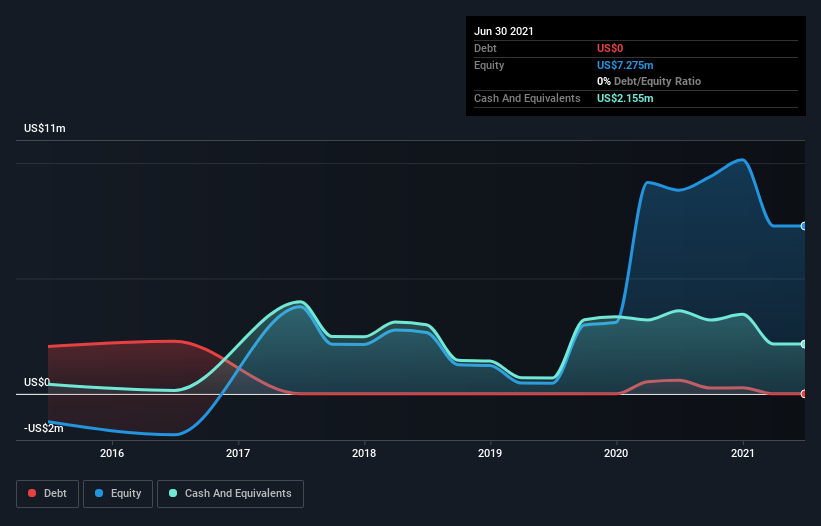Tinybeans Group (ASX:TNY) Is In A Good Position To Deliver On Growth Plans
Just because a business does not make any money, does not mean that the stock will go down. For example, biotech and mining exploration companies often lose money for years before finding success with a new treatment or mineral discovery. Nonetheless, only a fool would ignore the risk that a loss making company burns through its cash too quickly.
So, the natural question for Tinybeans Group (ASX:TNY) shareholders is whether they should be concerned by its rate of cash burn. In this article, we define cash burn as its annual (negative) free cash flow, which is the amount of money a company spends each year to fund its growth. The first step is to compare its cash burn with its cash reserves, to give us its 'cash runway'.
Check out our latest analysis for Tinybeans Group
Does Tinybeans Group Have A Long Cash Runway?
A company's cash runway is calculated by dividing its cash hoard by its cash burn. In June 2021, Tinybeans Group had US$2.2m in cash, and was debt-free. Importantly, its cash burn was US$1.6m over the trailing twelve months. Therefore, from June 2021 it had roughly 16 months of cash runway. While that cash runway isn't too concerning, sensible holders would be peering into the distance, and considering what happens if the company runs out of cash. You can see how its cash balance has changed over time in the image below.

How Well Is Tinybeans Group Growing?
We reckon the fact that Tinybeans Group managed to shrink its cash burn by 25% over the last year is rather encouraging. And arguably the operating revenue growth of 96% was even more impressive. We think it is growing rather well, upon reflection. Of course, we've only taken a quick look at the stock's growth metrics, here. You can take a look at how Tinybeans Group is growing revenue over time by checking this visualization of past revenue growth.
How Hard Would It Be For Tinybeans Group To Raise More Cash For Growth?
Tinybeans Group seems to be in a fairly good position, in terms of cash burn, but we still think it's worthwhile considering how easily it could raise more money if it wanted to. Generally speaking, a listed business can raise new cash through issuing shares or taking on debt. Many companies end up issuing new shares to fund future growth. By looking at a company's cash burn relative to its market capitalisation, we gain insight on how much shareholders would be diluted if the company needed to raise enough cash to cover another year's cash burn.
Tinybeans Group has a market capitalisation of US$25m and burnt through US$1.6m last year, which is 6.6% of the company's market value. Given that is a rather small percentage, it would probably be really easy for the company to fund another year's growth by issuing some new shares to investors, or even by taking out a loan.
Is Tinybeans Group's Cash Burn A Worry?
Tinybeans Group appears to be in pretty good health when it comes to its cash burn situation. Not only was its cash burn relative to its market cap quite good, but its revenue growth was a real positive. Considering all the factors discussed in this article, we're not overly concerned about the company's cash burn, although we do think shareholders should keep an eye on how it develops. On another note, Tinybeans Group has 4 warning signs (and 1 which is concerning) we think you should know about.
Of course, you might find a fantastic investment by looking elsewhere. So take a peek at this free list of interesting companies, and this list of stocks growth stocks (according to analyst forecasts)
Valuation is complex, but we're here to simplify it.
Discover if Tinybeans Group might be undervalued or overvalued with our detailed analysis, featuring fair value estimates, potential risks, dividends, insider trades, and its financial condition.
Access Free AnalysisHave feedback on this article? Concerned about the content? Get in touch with us directly. Alternatively, email editorial-team (at) simplywallst.com.
This article by Simply Wall St is general in nature. We provide commentary based on historical data and analyst forecasts only using an unbiased methodology and our articles are not intended to be financial advice. It does not constitute a recommendation to buy or sell any stock, and does not take account of your objectives, or your financial situation. We aim to bring you long-term focused analysis driven by fundamental data. Note that our analysis may not factor in the latest price-sensitive company announcements or qualitative material. Simply Wall St has no position in any stocks mentioned.
About ASX:TNY
Tinybeans Group
Operates a consumer subscription platform for parents and families in the United States, Australia, and internationally.
Flawless balance sheet with medium-low risk.
Similar Companies
Market Insights
Community Narratives



